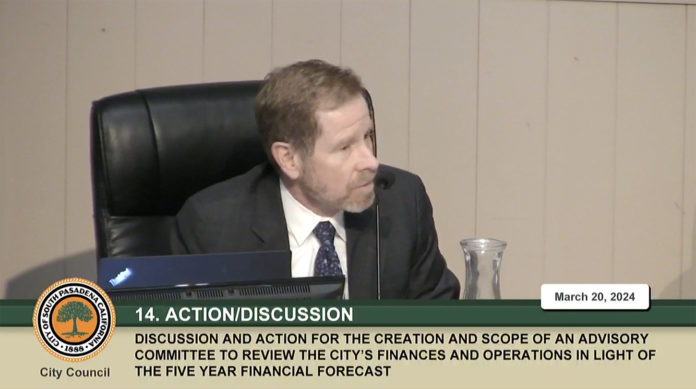
In a wide-ranging and at times contentious seven-hour session, South Pasadena City Council members on Wednesday evening: killed a panel reviewing details of the city’s projected budget deficits; partially backed off a controversial new fee imposed on a South Pasadena Education Foundation (SPEF) fund-raising event; issued an ad hominem attack against a public commenter; directed preparation of a ballot measure setting term limits for city council members; and provided direction on “slow streets” improvements to a set of city streets.
● During a tense, hour-long discussion that began well after midnight, Council voted 3-to-2 against reauthorizing a temporary committee it created late last month to review city finances in light of long-awaited projections from city contractor NHA Advisors forecasting millions of dollars in budget deficits over the next five years. The committee, composed of Mayor Evelyn Zneimer, Council Member Janet Braun and Finance Commission members Sheila Rossi and Peter Giulioni, held several meetings and provided an update during the Council’s March 6 meeting.
The vote to rescind the committee came at the behest of former Finance Commissioner Ed Elsner who in a series of messages to the city attorney argued it did not comply with the Brown Act. Citing the evolution of justifications Elsner submitted, Zneimer, Braun and Rossi each expressed suspicion that Elsner’s real motive was not to achieve compliance, but to kill the review. They pointed especially to his failure to raise Brown Act concerns over a similarly structured temporary finance review committee the city authorized in 2020 on which he served but from which he later withdrew.
Council Member Jon Primuth said he’d lost confidence in Commissioner Rossi and the committee, because it had gone beyond its scope, seemed to have a “very strong political agenda,” and offered many proposals that were “not well-developed.” He accused Rossi of making statements that included “completely wrong, false information.” He also asserted that the committee, which met extensively with staff, had shown “not a sliver of interest” in hearing from the Finance Department director or his staff.
Council Member Michael Cacciotti condemned “the tone” of the committee, its “distortions [and] misrepresentations,” and issuance of an avalanche of picayune data requests, all of which was hurting staff morale, causing them “to leave for other cities.”
Mayor Zneimer and Council Member Janet Braun, both of whom served on the committee, strongly advocated its re-authorization, in part citing staff stonewalling. “We haven’t seen financial statements in nine months!”–a violation, Braun noted, of the city’s finance policies. Braun said she’d voted for last year’s budget based on a “leap of faith” only to be blindsided by last month’s disclosure from NHA Advisors of projections showing city “insolvency in three-to-six years.”
Braun complained the cuts staff are now proposing are concentrated only on city services and said she was offended by her colleague’s’ notion the committee’s work was worthless. “I don’t understand why we are so afraid to let people look into the financials.”
Primuth wanted to know if Braun was offended by “the false statements that Commissioner Rossi gave us.” The two tangled over an example Primuth gave concerning whether budgeted but unfilled positions count as deficit. Braun said she’d learned only that day that only some of the authorized positions are budgeted. And while hopeful a three-hour meeting she’d had that day with the city manager and finance director had helped clear up a miscommunication that would facilitate provision of more useful data to the committee, that was before the Council voted not to reauthorize it.
Mayor Zneimer noted Braun had conditioned her support of last year’s budget on provision of the five-year projections NHA Advisors issued last month, the Mayor had voted against it. “I don’t want to be like the City of Bell. I don’t want to be bankrupt.” Council members are elected to manage the budget, not cut services, she said, and complained of a “disconnect” whereby “staff continues to spend as they wish, because they said the Council never directed them to do a hiring freeze.” As a result, they “are continuing to spend money like water and use the budget like a shopping list. We don’t have that kind of money.” Reauthoriztion of the committee would add needed “checks and balnces” to restore the city’s financial health. The Mayor tagged her remarks noting the three male members of the Council were about to vote against the two female members who’d served on the committee. “I think it’s gender bias.”
● Council also voted 3-2 to reduce to $5,000 from $20,000 the use fee it imposed Feb. 21 on SPEF for its May 18, 2024 Parti Gras fundraiser at the city-owned Arroyo Seco Golf Course. The funds SPEF raises are used to support grants, programs and initiatives at the city’s public schools. The use fee would’ve eaten roughly a fifth of what SPEF netted during last year’s Parti Gras.
Prior to Feb. 21, the use fee was minimal, limited to staff costs and insurance coverage, and did not collect for estimated average lost revenues from green fees, golf club rentals and other sources totaling $6,850 per day. The vote came after SPEF and its supporters protested the size of and short notice given for the fee.
The fee was agendized in response to a Dec. 20, 2023 motion from Council Member Caccioitti, who asked staff to fast-track a fee to recover the city’s costs and lost revenues for events at the Golf Course such as PartiGras, ahead of the completion of a “comprehensive” study the city is undertaking to update its five-year-old fee schedule for all city facilities. The study, previously set for completion last January, will include fees for any new services or areas for which fees do not currently exist.

“We took a rash action” in approving the fee, Council Member Braun said, noting the Council had just learned of the deficit projections. She supported full waiver of the $20,000 fee this year pending completion of the comprehensive fee review.
Council Member Cacciotti agreed, saying the fee was too high but that the city should recover its costs.
Council Member Primuth supported waiving the fee this year, questioned why this one fee was fast-tracked for the Feb. 21 meeting when the comprehensive study is still underway, and wanted to await its completion before authorizing a permanent fee.
Council Member Jack Donovan wanted to reduce but not eliminate the fee and proposed the $5,000 charge ultimately adopted. Primuth and Braun, who argued there was no “economic justification” for the $5,000 figure, ultimately voted against the decrease.
Citing her review of the non-profit SPEF’s tax filing, Mayor Zneimer said the group “has plenty of money,” including over a million dollars in investments, and pays its executive director a salary even while claiming it is composed entirely of volunteers. Her questions also elicited the disclosure that in response to the $20,000 fee the Council imposed on SPEF at its Feb. 21 meeting, the school district announced a $20,000 increase in the fee it levies on the city for use of the high school football field.
● Council unanimously approved a $1,000 expenditure sought by Council Member Cacciotti for a press conference and publicity for the City Hall/Civic Center Electrification project, which included electrification of police department’s vehicle fleet. During public comment. citizen Alan Ehrlich suggested the expenditure was inappropriate with the city facing projected budget deficits. He said it was at odds with a comment Cacciotti made earlier about the city’s need to manage resources responsibly. Addressing Cacciotti, he added, “It’s good you didn’t spit out your coffee while I was reading that line.”
Normally Council members do not respond directly to public commenters, but Cacciotti broke form, referring to Ehrlich as among “these small-minded, myopic people who are just distorting the truth.” He noted the press conference was among the city’s obligations under a nearly $500,000 grant he helped secure for the city from a committee of the South Coast Air Quality Management District (AQMD), where Cacciotti serves as the recently elected Vice Chair Member, and offered a vociferous defense of both the benefits of the grant and the cost of expenditure.
● The Council voted unanimously to place on the Nov. 5, 2024 ballot a measure that would limit city council members to three consecutive four-year terms. The vote came after a presentation sought by Council Member Braun. City Attorney Roxanne Diaz said the best data available shows that currently, at least 133 of California’s 482 cities have term limits, including Alhambra, Arcadia, Monterey Park, San Marino and Temple City.
● In connection with a two-and-a-half-hour presentation on “Slow Streets” program plans and installations, the Council gave the following direction:
—Oak St: Maintain the painted crosswalks at nine intersections; maintain pedestrian warning signs and street markings (yield and intersection crossing bicycle markings); update the center median striping with permanent material at Oak and Fletcher; and update certain curb extensions at Oak and Fremont and Oak and Marengo with alternative equipment.
—Grand Ave: Remove the bike lane, bike signs, bike marking, curb extensions, temporary tape, delineators and signs.
—Hermosa St: Remove all equipment except the stop bar and marking at Hermosa and Hillside, and determine if the red curb is needed to maintain the uphill bike lane along northbound Hermosa St.
—Mission St: Approve the purchase and replacement of k-rails at the northeast corner of Mission and Meridian (currently, the city rents them). Consider bike lanes on either Mission or El Centro; integrate street signage and wayfinding for Mission St; and continue the “road diet” configuration on Mission.















.png)






